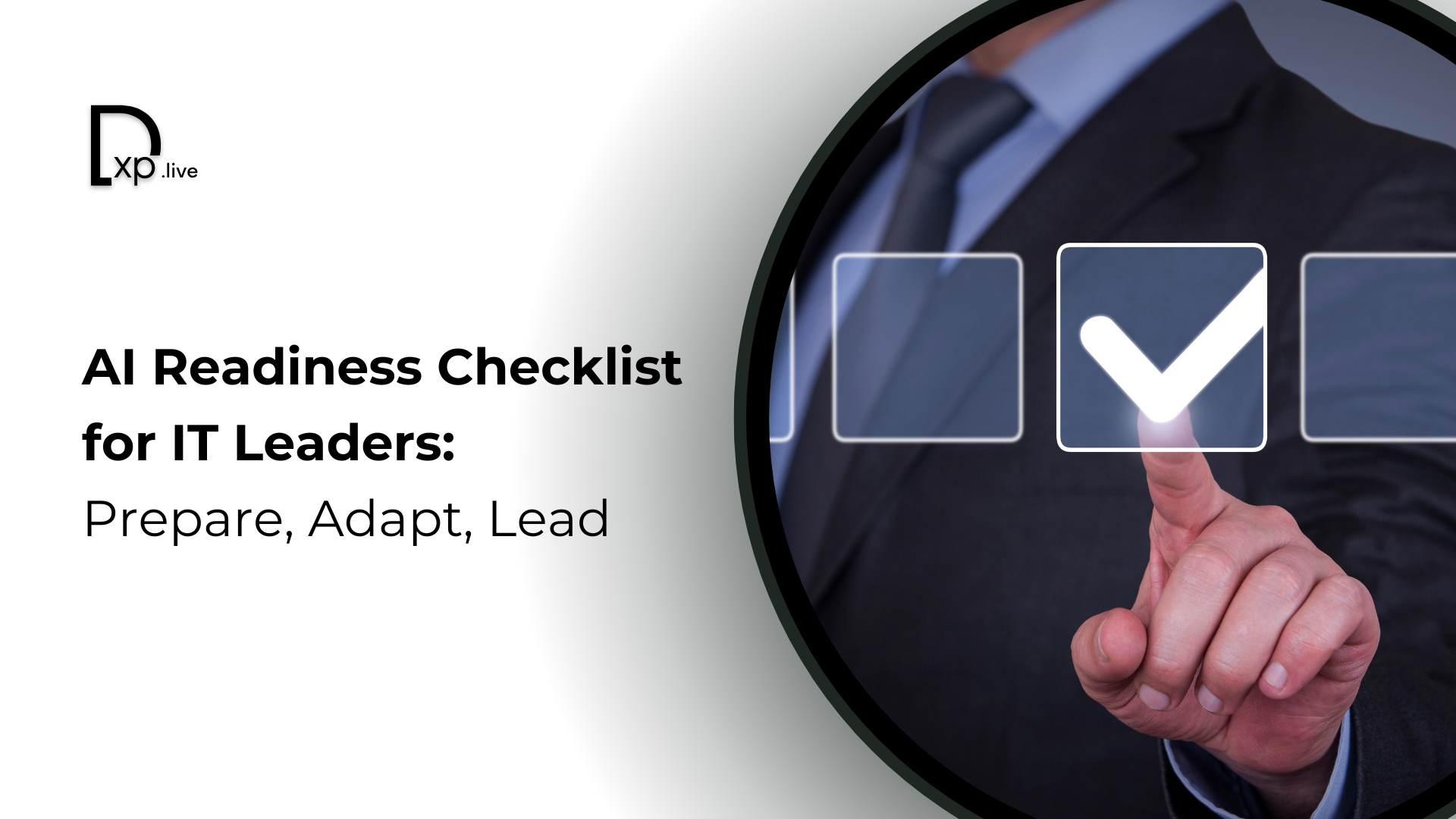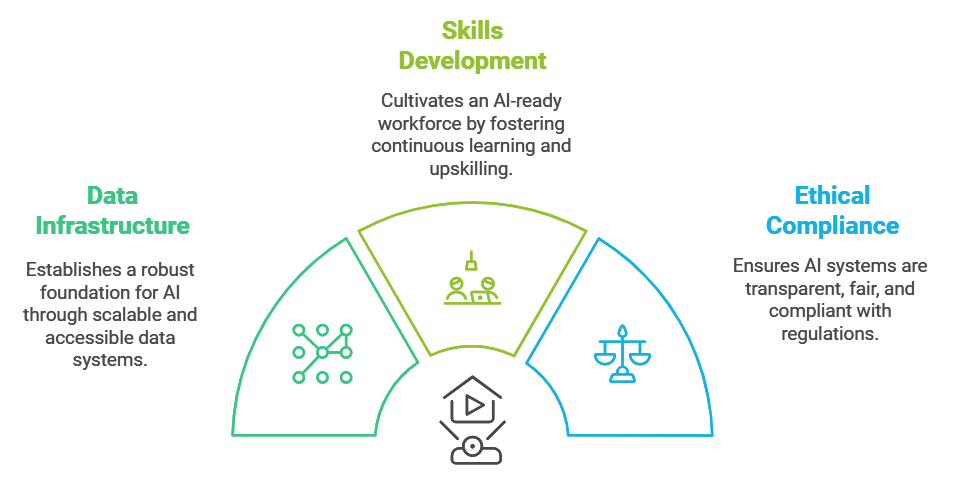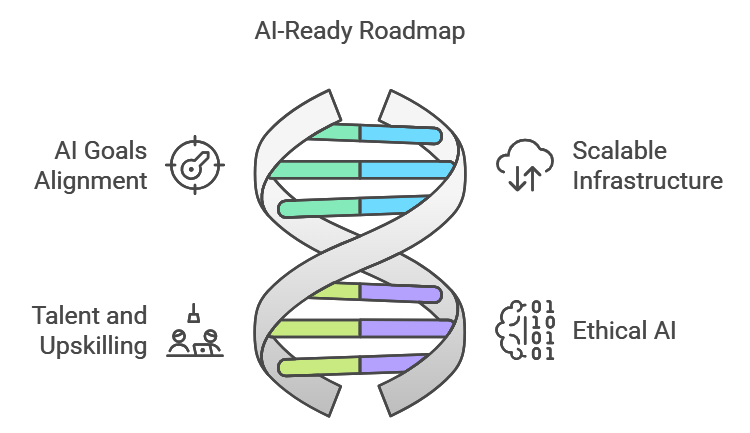AI Readiness Checklist for IT Leaders: Prepare, Adapt, Lead

As AI reshapes IT and enterprise landscapes, its integration is no longer optional—it's a strategic imperative. For IT leaders, guiding their organizations toward AI readiness means navigating a rapidly evolving, AI-driven future while building robust data infrastructure and addressing ethical AI concerns. This guide provides insights into crafting a sustainable AI roadmap, addressing the skills gap with machine learning expertise, and managing cybersecurity AI risks. Readers will discover essential strategies for responsible AI adoption, anticipate common obstacles, and gain actionable steps to steer successful implementation. This is a comprehensive toolkit for IT leaders ready to lead with AI responsibly and effectively.
The Importance of AI Readiness in Today’s Business Landscape
In the current AI landscape, it can be understood that going deeper into AI practice is essential for organizations seeking to improve processes, invest in innovations, and remain relevant to the customers and to other firms. Predictive AI analytics as well as AI cybersecurity have revolutionized the way organizations work, achieving speed and insight into business decisions that were previously unimaginable. Such transformation can only be delivered by the IT leaders who are a key part of frenching AI across the organization and who define AI strategy that is best suited for the organization's needs.
The IT leaders foster AI transformations based on a strong data backbone with a view to responsible AI. The AI economy of today is at the cusp of 3 other tech advancements—Generative AI, Machine Learning, and Automation, and therefore there’s a need for IT leaders to reskill on MLOps as well as responsible AI practices. As IT leaders adopt these technology trends, they are then in a position to lead AI transformation for the organizations while ensuring that AI is used ethically and will help in delivering long-term value to organizations.
Key Areas IT Leaders Need to Address for AI Readiness
For AI readiness, IT leaders must strategically address three critical areas:

1. Data Infrastructure and Management
A robust data architecture is foundational for AI-driven transformation. Scalable infrastructure enables real-time processing and analysis while maintaining data accessibility, integration, and quality, which is essential to AI performance. IT leaders should prioritize investments that support seamless data flow and governance across departments.
2. Skills and Talent Development
AI adoption requires specialized skills in data science, machine learning engineering, and cybersecurity AI. Developing an AI-ready workforce means fostering a culture of continuous learning and upskilling, ensuring teams are equipped for the AI-driven future.
3. Ethical and Regulatory Compliance
Responsible AI requires adherence to ethical standards such as transparency and fairness. IT leaders must navigate key regulations, including GDPR and the EU's AI Act, to ensure compliant and trustworthy AI systems. A clear AI roadmap that emphasizes responsible AI practices is critical for sustainable growth.
Creating an AI-Ready Roadmap for Your Organization

To prepare for an AI-driven future, IT leaders need a comprehensive AI roadmap. Start by defining AI goals aligned with business objectives, ensuring your AI initiatives deliver measurable value based on organizational needs. Setting realistic goals helps bridge the gap between vision and execution, facilitating smoother AI adoption.
Next, build a scalable AI infrastructure by integrating cloud solutions, data lakes, and AI platforms that can handle your data and computing needs as they grow. This infrastructure serves as the backbone of a robust data infrastructure and enables more sophisticated AI applications.
Investing in talent and upskilling is also essential. Recruit and retain professionals skilled in machine learning and cybersecurity AI, while prioritizing upskilling existing teams to foster an AI-competent workforce.
Finally, incorporate ethical AI and compliance measures into your roadmap. A responsible AI framework supports transparency, trust, and alignment with regulatory standards, ensuring AI development is both effective and ethical.
Overcoming Common Challenges in AI Readiness
At this stage, challenges during the period of AI readiness have to be dealt with as the transition to the AI era is inevitable. The first challenge to be pinpointed is the quality and accessibility of data - data fragmentation and interoperability challenges can restrict deploying AI efficiently. Such concerns should be compensated for by developing appropriate organizational data architecture that allows easy access and sharing of data within and between organizational units.
Moreover, there are problems such as skills shortage and change management. The heads of IT should work out tactics on how to fill up the shortage of human resources by providing training in machine-learning skills and building an enabling environment for AI integration.
Another important element is AI risks and biases management. Following recommended approaches to responsible AI use is important in respecting ethical AI guidelines, and hence reducing bias in decision making. By addressing these persistent challenges, organizations will be able to develop a well-rounded AI blueprint that improves their AI posture and strengthens the cybersecurity AI tools of the organization, thus increasing the chances of successful AI deployment.
Tools and Technologies to Accelerate AI Readiness
For IT leaders to be successful in an AI-driven future, they must make the right investments in the AI tools they need to fortify their data fabric and make AI more accessible. Be familiar with key resources such as cloud AI platforms (e.g. AWS, Google Cloud) for access to scalable computing power and data analytics tools (e.g. Tableau, Power BI) for efficient data visualization. Machine learning frameworks such as TensorFlow and PyTorch play a fundamental role in the creation of AI applications.
When choosing AI tools, it is important to align them with the organizational goals as well as the existing infrastructure. This step guarantees seamless incorporation and optimizes the influence of AI projects.
Well-scoped AI roadmaps can be illustrated by Successful case studies. For example, enterprises including those leveraging machine learning with ethical AI have achieved substantial increases in efficiency and compliance, coupled with improved cybersecurity AI. Responsible AI strategies can help organizations move forward with confidence along the AI readiness path.
To summarize, AI readiness is fundamental to being successful in an AI-driven future for IT leaders. Solid data infrastructure facilitates smooth data flow to adopt AI effectively. The key to innovation is honing machine learning skills within your team. Trustworthy AI is the practice of using AI responsibly; it is key to protecting your organization’s reputation. Then your journey into this fledgling world can also be protected by integrating security AI solutions protecting your assets. Start creating an AI roadmap of immediate next steps — this will help your organization be ready for the opportunities and challenges that will come on the horizon. Start your journey today!
Be at the forefront of technological innovation! Join our vibrant community to unlock expert insights, exclusive content, and the latest news on AI, IoT, and cutting-edge retail solutions. Stay informed, get inspired, and be part of the conversation—subscribe digitalexperience.live today for your gateway to the future!
FAQs
1. What is AI readiness?
AI readiness is an organization’s ability to implement AI technologies effectively, focusing on data infrastructure, machine learning skills, ethical AI practices, and a solid AI roadmap.
2. Why is AI readiness important for IT leaders?
AI readiness helps IT leaders navigate the AI-driven future, improving processes and decision-making while ensuring ethical AI use to maintain competitiveness.
3. What are the key areas to focus on for AI readiness?
Key areas include robust data infrastructure, addressing skills gaps in machine learning, and ensuring compliance with ethical standards for successful AI adoption.
4. How can organizations create an AI roadmap?
Organizations can create an AI roadmap by setting clear goals aligned with business objectives, investing in scalable infrastructure, upskilling employees, and incorporating ethical AI practices.
5. What challenges do IT leaders face in achieving AI readiness?
Challenges include data quality issues, workforce skills shortages, and managing AI risks. Addressing these requires targeted training, better data governance, and ethical compliance for successful deployment.



